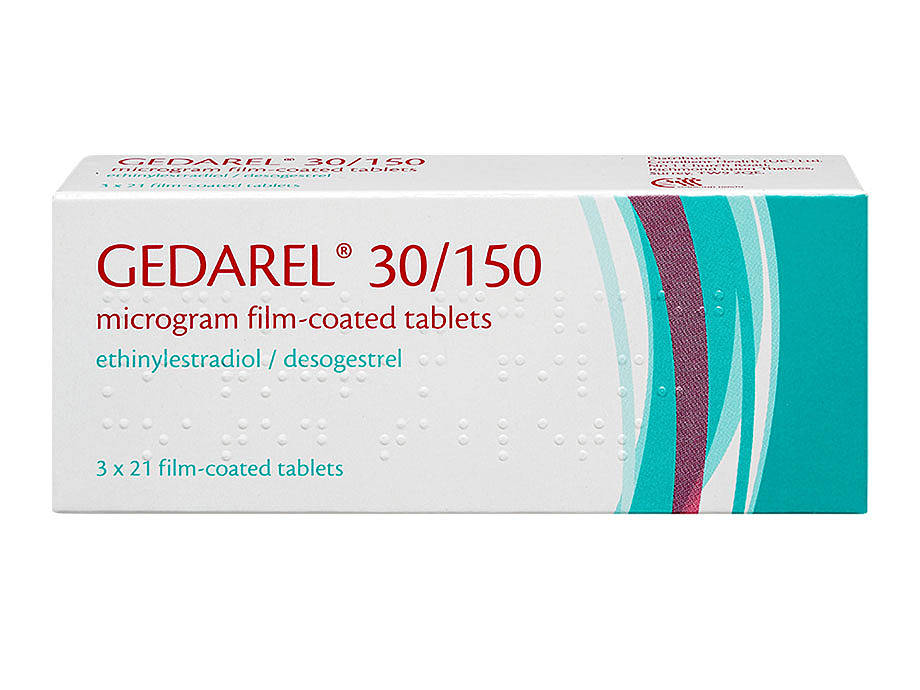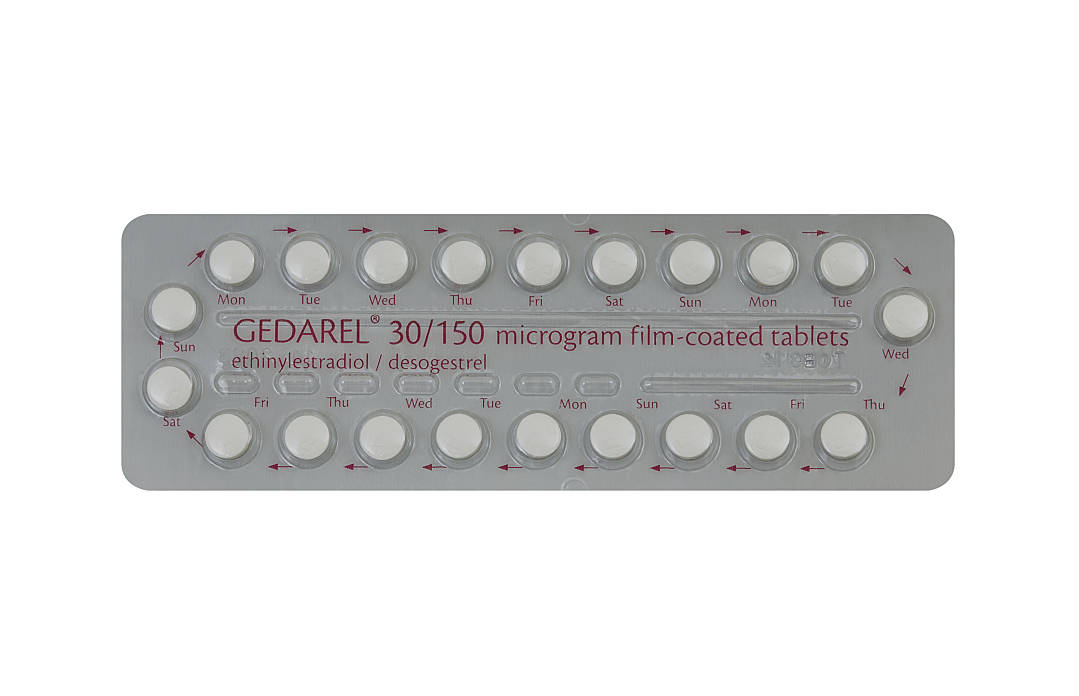







Prices from £15.00
In stock. Simply fill in a brief consultation questionnaire and one of our doctors will review your request today.
Find your combined pill online
-
Gedarel is a combined contraceptive pill used to help to prevent pregnancy. It’s available in 2 forms: Gedarel 30/150 and Gedarel 20/150. Each version contains different amounts of man-made oestrogen (20 or 30 micrograms), but the same amount of artificial progesterone (150 micrograms). When taken correctly, Gedarel is up to 99% effective, but this also depends on how you take it (not missing pills).
Gedarel is a branded treatment that is manufactured by Gedeon Richter (UK) Ltd. You can find out more in the patient information leaflet.
Prices
6 x 21 tablet(s) - £24.99
3 x 21 tablet(s) - £17.99
6 x 21 tablet(s) - £22.00
3 x 21 tablet(s) - £15.00



About Gedarel
-
-
Gedarel contraceptive pill is a type of hormonal birth control which you can use to prevent pregnancy. It’s known as a combined contraceptive pill, as it contains the active ingredients desogestrel and ethinyl estradiol. These are similar to the hormones your body naturally produces during your menstrual cycle (progesterone and oestrogen).
Taking Gedarel prevents ovulation, making it harder for sperm to get through your cervix. It also thins the lining of your womb making it harder for a fertilised egg to implant and grow.
Gedarel can also be used to reduce unwanted menstrual symptoms, such as painful periods or heavy bleeding. It can also help with acne in some cases, reducing the amount of oil your skin produces. If you want to take Gedarel for this reason, speak to your doctor first, as Gedarel 30 may be the best option.
Gedarel contraceptive pills don't protect you against sexually transmitted infections (STIs). One of the most effective ways to prevent STIs is to use a condom during sex.
What type of pill is Gedarel?
Gedarel is a combined pill, a type of contraception that contains a combination of man made versions of the hormones progesterone and oestrogen.
-
-
“Gedarel is a combined pill, meaning it contains two hormones which work primarily by stopping the ovaries releasing eggs. Combined pills are widely used and are an effective method of contraception more than 99% of the time, providing they are taken correctly.” - Dr Babak Ashrafi, Clinical Lead for Service Expansion.
-
-
The difference between Gedarel 20/150 and Gedarel 30/150 is that there is less artificial oestrogen (ethinylestradiol) in Gedarel 20 pills. Gedarel 20 contains 20 micrograms of ethinylestradiol and Gedarel 30 contains 30 micrograms.
Gedarel 20
You may want to use Gedarel 20 if you have a low body weight, or you are sensitive to the hormone oestrogen.
You might be sensitive to oestrogen if you start to get strong headaches while on the pill. If you’re taking Gedarel 30 and keep getting headaches, you can easily switch to Gedarel 20. If the headaches do not stop, your doctor may recommend to come off the pill or switch to a progesterone only pill instead.
Another benefit of taking Gedarel 20 instead of Gedarel 30 is that there’s a slightly lower chance of getting a blood clot as a side effect.
Gedarel 30
You might want to take Gedarel 30 if you want stronger effects of oestrogen. Taking oestrogen can lead to improvements to period-related conditions like PMS and other conditions, such as acne.
If you want to get the strongest oestrogen effect and you’re ok with the higher risk of oestrogen-related side effects then Gedarel 30 could be a good choice for you.
-
-
Gedarel is a contraceptive pill used for preventing unwanted pregnancy, sometimes referred to as birth control. Gedarel pills can also be used to treat premenstrual stress (PMS), acne and other hormone-related conditions.
-
-
Gedarel can be taken in several different ways, depending on what you’re taking it for (preventing pregnancy and/or for hormone-related conditions). This can also depend on your preference, such as whether or not you want to have a break between packs and a withdrawal bleed. Below we look at the different ways you can take the Gedarel pill, but always follow your doctor's or pharmacist's instructions. If you want to change how you take Gedarel, get advice from your doctor first.
If you’re taking cyclical Gedarel (21 days with a 7-day break): Swallow 1 tablet whole with water if needed at the same time every day for 21 days. Then take a 7-day break from taking your contraceptive pill. During this 7-day break you may have a withdrawal bleed, similar to a period. After 7 days of not taking Gedarel, you should start the next strip, even if you’re still bleeding.
If you’re taking Gedarel continuously (without a break): Take 1 Gedarel pill every day, at the same time each day if possible. Don’t take a break between packets and instead continue with your treatment. You aren’t likely to get withdrawal bleeds, although there is a chance of persistent breakthrough bleeding. If this happens, take a 4-7 day break, as long as you’ve been taking Gedarel pills for at least 21 days beforehand. Restart the pill for at least 21 days to maintain its effectiveness. If you get more breakthrough bleeding after this break, speak to your doctor.
If you’re taking Gedarel on an extended regime (taking more than 1 pill packet before having a break): Take 1 Gedarel pill at the same time each day. You and your doctor will discuss how many packets you’ll take before having a pill-free break, but this is usually 3 Gedarel packets. You’ll then have a 4-7 day break where you may have a withdrawal bleed.
Taking Gedarel continuously or on an extended regime is known as an off-licence use, as these instructions aren’t listed by the manufacturer. A doctor can still prescribe Gedarel in this way if they think it will benefit you, such as if you want less breaks or you have PMS.
The back of a Gedarel strip of tablets is labelled with every day of the week to help you remember to take your daily pill. If you need extra help remembering, you can try setting an alarm, using pill reminder boxes or use an app that helps you track your pill.
When to start taking Gedarel
When you should start taking Gedarel depends on your circumstances, such as if you’re already taking another form of contraception.
If you want to start taking Gedarel and you are not currently taking another contraceptive pill
If you have not used any oral contraception during your last menstrual cycle:
- If possible, take a Gedarel pill on the first day of your next period – the day when bleeding starts. Take a tablet marked on the packet for that day of the week. Then, follow the direction of the arrows to know which pills to take next.
- If you start taking Gedarel on days 1-5 of your period you will still be protected.
- If you start after day 5, you should use another method of contraception for the first 7 days, such as a condom, to help prevent pregnancy.
If switching from a mini pill/progestogen only pill, progestogen releasing IUD, injection, or implant
If you are switching to Gedarel from a progesterone-only pill (mini pill) or a progesterone-releasing IUD, injection or implant, you can switch on any day.
With an IUD or implant you can take Gedarel on the day it is removed. With an injectable, take your first Gedarel pill when the next injection would have been due.
In all cases, you should use another method of contraception such as a condom for the first 7 days of taking Gedarel.
If you are switching a combined pill made by another brand
If you are changing to Gedarel from another combined pill, combined contraceptive ring or patch, you should ideally start taking Gedarel on the day after the last active tablet of your previous combined pill. This means you won’t take a pill-free break if you usually do.
At the latest, you should start Gedarel on the day after the last day of your pill-free break or after the last hormone-free tablet of your previous combined pill, if you’re taking a 28-day pill.
If you are switching to Gedarel from a vaginal ring or transdermal patch, you should start taking your pill on the day it gets removed.
What should I do if I vomit after taking the pill?
If you throw up or have severe diarrhoea within 2-3 hours of taking Gedarel, you should take another Gedarel pill to replace it. If these symptoms last more than 24 hours you should follow the advice for missing more than 1 pill.
Gedarel missed pill: what should I do if I miss a Gedarel pill?
If you miss a Gedarel pill, you should take it as soon as you remember. If it’s been less than 24 hours since you forgot to take it, take it even if it means taking it with your next pill.
What should I do if I’m too late to take a Gedarel pill?
If it’s been less than 24 hours since you should have taken your pill, it’s not too late and you should take one immediately. Beyond 24 hours, the protection against pregnancy may be reduced. If you forget more than 1 Gedarel pill, you should contact your doctor.
A full explanation of what to do if you miss your Gedarel pill according to which week of your menstrual cycle you’re in can be found in the Gedarel patient information leaflet.
➤ You can also see our page on what to do if you forget the pill.
Can you take Gedarel continuously? Can I take Gedarel back to back?
Yes you can take Gedarel continuously (sometimes referred to as ‘back-to-back’), following the directions given to you by your doctor and the patient information leaflet. You should not take more than one tablet in a day unless directed to do so by your doctor.
Taking Gedarel back-to-back is just as safe and effective as taking it with the pill-free break. It can be more expensive to take Gedarel this way though, since you’re paying for an extra 7 pills every 28 days.
-
-
Gedarel pill works by releasing synthetic oestrogen and progesterone into your body, and this:
- prevents ovulation (an egg being released from your ovaries)
- thickens the mucus around your cervix, so that it is harder for sperm to get through
- thins the lining of your womb (uterus), so it’s harder for a fertilised egg to implant and grow
These effects work together to prevent you from getting pregnant, but for Gedarel to be most effective you need to take it without missing any pills.
How long does Gedarel take to work?
If you start taking Gedarel on days 1-5 of your menstrual cycle (day 1 is the first day you bleed), it’ll work straight away. If you start Gedarel at any other time, it’ll take 7 days to work. You should use other contraceptive methods, such as condoms, for the first 7 days of using Gedarel.
-
-
Gedarel’s effectiveness is high. When taken as advised, a combined pill such as Gedarel pill is more than 99% effective at preventing pregnancy. Fewer than 1 in 100 who use the combined pill correctly will get pregnant in 1 year.
A 2022 study journal reports that the chance of pregnancy when taking a combined oral contraceptive pill like Gedarel perfectly is 0.3%. However, it is estimated that the average chance of pregnancy across the population who take these contraceptives is about 9%, largely due to missed pills.
Take Gedarel at the same time every day for it to be most effective.
-
-
There are regulated doctor services such as ZAVA that allow you to buy prescription contraceptive pills online in the UK, including Gedarel. You may also be able to get Gedarel on the NHS, through your GP or a sexual health clinic.
Where can I buy Gedarel 30/150 online?
You can buy Gedarel 30/150 and Gedarel 20/150 online from ZAVA. In order to get Gedarel prescribed to you through ZAVA:
- Complete a short online questionnaire.
- Select your preferred treatment, log in or sign up and place your treatment request.
- One of our doctors will check your questionnaire answers to make sure your treatment is right for you.
- If your request is approved, your treatment will be dispatched to your preferred address.
Ordering through ZAVA is discreet and convenient. Free standard delivery is included with all treatments. Once you’ve received your treatment, you’ll be able to contact a doctor directly through your account for follow up advice.
-
-
When you stop taking Gedarel, you will no longer be protected against pregnancy. Coming off Gedarel increases the chances of you becoming pregnant if you have sex without using other protective methods. If you are coming off Gedarel and do not wish to become pregnant, speak to a doctor about other methods of birth control or visit ZAVA’s contraceptive pill homepage to pick an alternative.
When you stop Gedarel, any extra benefits to your periods or acne may also go away. So will any side effects if you have any.
-
-
Like any medication, Gedarel can cause side effects for some people. However, the severity and duration of Gedarel side effects will vary between individuals. Some people will not get any side effects from taking Gedarel. For people who do get them, these are usually mild and can go away after a while.
What are the main side effects of Gedarel?
Very common Gedarel pill side effects include:
- irregular bleeding
Common Gedarel pill side effects include:
- irregular periods
- no periods
- low mood
- mood changes
- headaches
- nausea
- dizziness
- acne
- weight gain
- abdominal pain
- tender breasts or breast pain
- premenstrual syndrome (PMS)
Uncommon Gedarel pill side effects include:
- migraines
- diarrhoea
- vomiting
- bumpy rash (urticaria)
- low sex drive
- fluid retention (bloating)
- hearing problems
- increase in blood pressure
If you get any contraceptive pill side effects that affect your daily life or that you are concerned about, you should speak with your doctor about it. They may suggest switching to another birth control pill or using other forms of contraception.
Read the patient information leaflet that comes with your pack of Gedarel combined pills to learn about any rare side effects. For more information on some of the specific side effects of the pill, see our pages on:
-
-
Gedarel contraceptive pill contains the following ingredients:
- active ingredients – 30 micrograms ethinylestradiol and 150 micrograms desogestrel
- non-active tablet core ingredients – potato starch; stearic acid; all-rac-alpha-tocopherol; lactose monohydrate; magnesium stearate; silica colloidal anhydrous; povidone K 30
- non-active tablet coating ingredients – hypromellose; macrogol 6000; propylene glycol
Does Gedarel contain oestrogen?
Yes, Gedarel combined pill contains ethinylestradiol, which is man-made oestrogen.
“Gedarel does contain an artificial oestrogen, which mimics the activity of this hormone in your body. Taking a combined pill with oestrogen can lead to some improvements to conditions like PMS or acne. But the downside is it comes with a risk of extra side effects like breast tenderness, headaches, nausea and mood swings. As long as combined pills are safe for you, you can decide if you want to take advantage of the oestrogen benefits and don’t mind the risk of side effects. You can always try a combined pill and then stop if you don’t like the results.” – Dr Babak Ashrafi, Clinical Lead for Service Expansion.
-
-
You can take Gedarel if you regularly have periods and want to protect yourself from getting pregnant. If you are over 35 and do not smoke, you can keep taking Gedarel and do not need to switch to a progesterone-only pill. This also depends on other factors, like your weight.
Who can't take the Gedarel contraceptive pill?
You should not take the Gedarel contraceptive pill if you have any existing conditions or you’re taking another medication that might make Gedarel unsafe or affect how it works.
For more information on existing conditions that might make Gedarel unsafe, see the ‘Gedarel contraceptive pill contraindications’ section. For more information on other medications that can react with Gedarel, see the ‘Gedarel interactions’ section.
-
-
You should not take Gedarel combined pill if you have:
- allergies to any of the ingredients in Gedarel pill, including lactose
- ever had a migraine with an aura
- liver disease or a liver tumour
- pancreatitis (inflammation of your pancreas)
- ever had a blood clot (thrombosis)
- ever had a stroke, heart attack or angina (heart pain)
- cervical or breast cancer
- diabetes
- high cholesterol
- high blood pressure (hypertension)
- endometrial hyperplasia
- hepatitis C
- an operation coming up – this could increase the risk of blood clots
You shouldn’t take Gedarel if you’re pregnant. You may be able to use it while breastfeeding, depending on how long it's been since your delivery.
If you cannot take the Gedarel pill, you can speak to a doctor or fill out an online questionnaire with ZAVA to help you find another form of birth control.
-
-
Gedarel can interact with certain medications that you might be taking, including supplements or herbal products. Before you take Gedarel pill, you should let your doctor know if you’re taking medication for:
- epilepsy, such as topiramate, lamotrigine or phenytoin
- tuberculosis, such as rifampicin
- hepatitis C or HIV, such as ritonavir
- fungal infections, such as griseofulvin
- an underactive thyroid, such as levothyroxine
- arthritis, such as etoricoxib
- low mood, such as St. John's Wort
- muscle stiffness, such as tizanidine
- suppressing your immune system, such as ciclosporin
Taking these medications along with Gedarel may make your pill less effective, so you might get pregnant if you use them at the same time. Gedarel may stop these medications from working properly too.
-
-
If you’re looking for an alternative to Gedarel combined pill, ZAVA can prescribe other contraceptive pills that you can use instead that are just as effective. This includes:
- other combined contraceptive pills, such as Lucette
- progestogen-only mini pills, such as Cerazette
There are also other types of contraception, such as:
- barrier methods (condoms, female condoms, contraceptive diaphragm)
- copper and hormonal IUD
- birth control patches, such as Evra
- vaginal ring
You can speak to a doctor or fill out a form with ZAVA Online Doctor to find the most suitable birth control method for you. You can also check out one of these pages to find out more about each pill:
-
-
In summary, Gedarel is a good option for someone who wishes to prevent pregnancy. Like any medication, Gedarel is not suitable for everyone – please read the advice in the ‘Who can't take the Gedarel contraceptive pill?’ section to find out who should not take Gedarel. If you’re unsure about taking Gedarel, speak to a doctor or complete a ZAVA questionnaire to get advice on which contraceptive pill is most appropriate for you.
-
Frequently asked questions
Is Gedarel the same as Marvelon?
Gedarel and Marvelon are very similar, as they’re both combined pills which contain the same types and quantities of man-made oestrogen and progesterone. This means they work in almost exactly the same way, the only difference is some of the non-active ingredients in the pills and the manufacturer.
Is Gedarel good for contraception?
Yes, Gedarel is a combined pill with the purpose of preventing unwanted pregnancy, but it’s most effective when taken correctly. No form of contraception can be 100% guaranteed, but when taken perfectly Gedarel is over 99% effective.
Do you ovulate on Gedarel?
You don’t usually ovulate during Gedarel treatment, but you may still get period-like bleeding, especially if you take a 7-day break during your cycle. Gedarel works by preventing your ovaries from releasing an egg, from sperm reaching an egg, and from an egg implanting itself in the lining of your womb (uterus).
Does Gedarel stop periods?
Gedarel can cause your periods to become irregular, painful or heavier. However, some women stop getting periods when they take Gedarel. Even if your periods stop, you may still get some breakthrough bleeding.
Is Gedarel 30/150 good for acne?
The main use of Gedarel is as a contraceptive pill. However, because Gedarel alters the levels of hormones in your body, it can have an impact on your acne. Some people can get acne as a side effect of taking Gedarel. Whether Gedarel 30/150 is good for acne or not will depend on the individual, so its best to discuss this option with your doctor.
Does Gedarel cause weight gain?
Weight gain is listed as a common side effect of Gedarel, however this does not mean it will affect everyone in this way. Weight gain on Gedarel can be temporary due to water retention. If you gain a lot of weight for any reason whilst taking Gedarel, speak to your doctor, as there may be an increased risk of blood clotting or another reason you’re gaining weight.
Can Gedarel cause anxiety?
Gedarel can cause mood changes as a side effect. There is limited evidence linking hormone-based contraceptives to anxiety. However, some people may find that contraceptive pills such as Gedarel relieve existing anxiety symptoms. The effects of Gedarel are different for each individual.
Can Gedarel make you depressed?
Gedarel can cause low mood and mood changes as a side effect for some people. It is listed as a common side effect, however this does not necessarily mean it will affect you. This may go away once your body gets used to the treatment, but you can always talk to your doctor if this is affecting your daily life.
Can Gedarel cause hair loss?
Hair loss is not listed as a side effect for Gedarel. However, it is possible to get side effects which are not listed in the patient information leaflet. If you do experience hair loss while taking Gedarel, speak to a doctor because there could be other causes.
Is Gedarel a mini pill?
No, Gedarel is a combined pill that contains synthetic versions of the hormones oestrogen and progesterone. A mini-pill is a progesterone-only pill which works by thickening the lining of your cervix to prevent sperm reaching an egg.

Dr Babak Ashrafi Clinical Lead for Service Expansion
Accreditations: BSc, MBBS, MRCGP (2008)
Babak studied medicine at King’s College London and graduated in 2003, having also gained a bachelor’s degree in Physiology during his time there. He completed his general practice (GP) training in East London, where he worked for a number of years as a partner at a large inner-city GP practice. He completed the Royal College of GPs membership exam in 2007.
Meet our doctorsLast reviewed: 15 May 2024
-
The combined oral contraceptive pill (2022) Patterson [accessed 07 May 2024]
-
Gedarel 30/150 Patient information leaflet (2023) EMC [accessed 07 May 2024]
-
Combined pill (2020) NHS [accessed 07 May 2024]
-
Is there a connection between hormonal birth control and anxiety? (2020) Healthline [accessed 07 May 2024]
-
Contraceptives, hormonal (2024) British National Formulary [accessed 07 May 2024]
Contraceptive pills are a reliable way of reducing your risk of getting pregnant from sex. ZAVA offers most common brands of pill, so you can order your preferred brand by visiting our contraceptive pill service page.
In stock. Prices from £15.00














